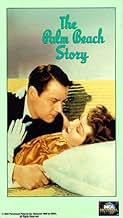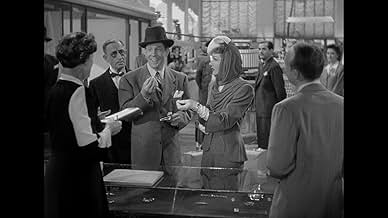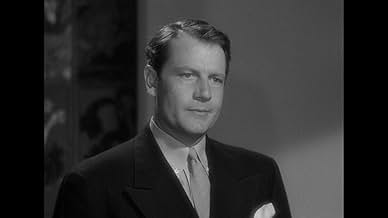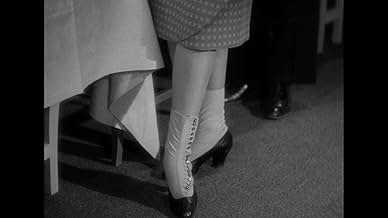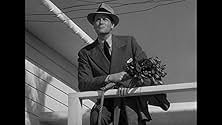AVALIAÇÃO DA IMDb
7,4/10
14 mil
SUA AVALIAÇÃO
A esposa de um inventor, diante das dificuldades financeiras enfrentadas pelo casal, tenta mudar a sorte de ambos casando-se com um excêntrico milionário.A esposa de um inventor, diante das dificuldades financeiras enfrentadas pelo casal, tenta mudar a sorte de ambos casando-se com um excêntrico milionário.A esposa de um inventor, diante das dificuldades financeiras enfrentadas pelo casal, tenta mudar a sorte de ambos casando-se com um excêntrico milionário.
- Direção
- Roteiristas
- Artistas
- Prêmios
- 1 vitória no total
Roscoe Ates
- Fourth Member Ale and Quail Club
- (as Rosco Ates)
- Direção
- Roteiristas
- Elenco e equipe completos
- Produção, bilheteria e muito mais no IMDbPro
Avaliações em destaque
"The Palm Beach Story" is a lopsided comedy (part of it's funny and part of it's not), but the movie is back-ended with all of the funniest bits, so it allows you to forget the slower parts and it sends you out on a high.
After a sensationally bizarre opening credits sequence, the movie settles down into a slightly less zingy version of "The Awful Truth." Claudette Colbert thinks her marriage to Joel McCrea isn't working, even though he doesn't think likewise. She thinks she's not a capable enough wife; he thinks he's a failure as a man and husband. She takes off for Palm Beach to get a divorce despite all of his attempts to stop her. On the train to Florida, she meets a wealthy tycoon who wants to marry her and give her everything she could possibly want, but she realizes that what she really wants is her husband.
This is all told with a lot of wit and flair. The early scenes with Colbert and McCrea drag, and an extended bit of nonsense on the train involving the Ale and Quail Hunting Club is superfluous and not very funny. But once everyone shows up in Palm Beach, the film becomes a delight, and a bonus is added in the person of Mary Astor, who plows on to the screen about half way through the film and decimates everyone in her path with her quick-tongued and hilarious performance as a rich society lady with a lot of time on her hands and her sights set on Colbert's husband.
What I liked about this film was that Colbert and McCrea don't seem to have a lot of chemistry in their early scenes together; he seems so stiff and bland, and you don't really blame her for wanting to get away. But after you've seen both of them with other people, they seem so much more right for each other when they get back together, and there's all this chemistry you didn't initially realize was there. I don't know if that's due to their performances, the writing, the directing, or whether it was just a happy accident, but it works beautifully.
Grade: A-
After a sensationally bizarre opening credits sequence, the movie settles down into a slightly less zingy version of "The Awful Truth." Claudette Colbert thinks her marriage to Joel McCrea isn't working, even though he doesn't think likewise. She thinks she's not a capable enough wife; he thinks he's a failure as a man and husband. She takes off for Palm Beach to get a divorce despite all of his attempts to stop her. On the train to Florida, she meets a wealthy tycoon who wants to marry her and give her everything she could possibly want, but she realizes that what she really wants is her husband.
This is all told with a lot of wit and flair. The early scenes with Colbert and McCrea drag, and an extended bit of nonsense on the train involving the Ale and Quail Hunting Club is superfluous and not very funny. But once everyone shows up in Palm Beach, the film becomes a delight, and a bonus is added in the person of Mary Astor, who plows on to the screen about half way through the film and decimates everyone in her path with her quick-tongued and hilarious performance as a rich society lady with a lot of time on her hands and her sights set on Colbert's husband.
What I liked about this film was that Colbert and McCrea don't seem to have a lot of chemistry in their early scenes together; he seems so stiff and bland, and you don't really blame her for wanting to get away. But after you've seen both of them with other people, they seem so much more right for each other when they get back together, and there's all this chemistry you didn't initially realize was there. I don't know if that's due to their performances, the writing, the directing, or whether it was just a happy accident, but it works beautifully.
Grade: A-
Claudette Colbert is a knockout who knows it. She wants the good life, which her inventor husband can't give her. So she leaves him, intending on marrying someone who can support her and finance his invention. Things don't quite work out.
The opening of "Palm Beach Story" is a bizarre scene that only makes some sense (and I'm emphasizing some) at the very end of the film. It's certainly an original way to start a movie. There are some hilarious scenes in this film - desperate to get to Palm Beach for a quickie divorce, but with no money, Colbert accepts the invitation of the gentlemanly Ale and Quail Club to ride in their private train car as their guest and mascot. Unfortunately, the emphasis in this club is the ale and not the quail - shooting sugar cubes will do - also blowing out train windows, trashing whole train cars - you get the idea. Running from them, Colbert soon meets up with Rudy Vallee, who gives an absolutely delightful performance as a filthy rich man. He serenades her at one point, and it's great, hearkening back to his days as a crooner! Mary Astor is his many times married sister, and when Colbert's husband shows, in the form of Joel McCrea, Astor sees her next mark.
McCrea has a funny slapstick fall down a flight of stairs, but otherwise, doesn't have much to do except be angry and jealous of his wife. Colbert in her glorious clothes, Vallee, and a vivacious Astor upstage him a bit. A very funny film, produced during World War II to give America a much-needed laugh.
The opening of "Palm Beach Story" is a bizarre scene that only makes some sense (and I'm emphasizing some) at the very end of the film. It's certainly an original way to start a movie. There are some hilarious scenes in this film - desperate to get to Palm Beach for a quickie divorce, but with no money, Colbert accepts the invitation of the gentlemanly Ale and Quail Club to ride in their private train car as their guest and mascot. Unfortunately, the emphasis in this club is the ale and not the quail - shooting sugar cubes will do - also blowing out train windows, trashing whole train cars - you get the idea. Running from them, Colbert soon meets up with Rudy Vallee, who gives an absolutely delightful performance as a filthy rich man. He serenades her at one point, and it's great, hearkening back to his days as a crooner! Mary Astor is his many times married sister, and when Colbert's husband shows, in the form of Joel McCrea, Astor sees her next mark.
McCrea has a funny slapstick fall down a flight of stairs, but otherwise, doesn't have much to do except be angry and jealous of his wife. Colbert in her glorious clothes, Vallee, and a vivacious Astor upstage him a bit. A very funny film, produced during World War II to give America a much-needed laugh.
Even more dementedly frantic than The Lady Eve, this film is Preston Sturges's most delirious screwball/slapstick romance, with one of the most amazing bits of comic combustion in the Ale and Quail Club train sequence. It's not as neatly structured as The Lady Eve, but it's filled with hilarious gags, lines, and performances. Claudette Colbert and Joel McCrea are remarkably composed and relaxed, but Rudy Vallee, Mary Astor, and all the other performers outdo themselves in energetic tomfoolery. When Vallee complains, plaintively, that the problem with the world is that the men most in need of a beating are usually enormous, or when Astor slyly suggests that she grows on people, like moss, you know you're hearing Preston Sturges's wit at its peak.
One element of this film that shouldn't be ignored is that it, like "Sullivan's Travels" and "The Miracle of Morgan's Creek," is a conscious lampooning of earlier movies from the 1930s. It takes a standard, conventional plot from those movies and turns it on its ear. The same plot can be seen for example in the Paramount movie from 1931, "Up Pops the Devil," with Carole Lombard and Norman Foster (who coincidentally was Claudette Colbert's first husband). In that movie, a wife who still loves her husband wants to divorce him for his own good; she thinks she's just a noose around his neck, and once rid of her, he'll become a success. It's set in the same upper crust of society as "The Palm Beach Story," with a millionaire suitor for the wife and a nymphomaniac girl for the husband. Here, everything is played straight, with as much pathos and melodrama being milked out of the situation as can be. In "The Palm Beach Story" though, the same basic plot and characters are used, but it's the comedic potential and wackiness of the situation that's emphasized, to marvelous effect.
The subplot with the twins, glanced at in the beginning and end of the picture, is another conscious lampooning of conventional movies, here a lampooning of the structure of movies themselves, of their conventional beginnings and endings. It's not meant to be taken seriously; as McCrea's character casually says at the end, it's all stuff "for another movie."
No words can be found to adequately praise Claudette Colbert's performance. Joel McCrea is good too, as the prototypical wooden 1930s leading man. Rudy Vallee is absolutely hilarious as a "momma's boy" version of John D. Rockefeller, as is Mary Astor as his rich nymphomaniac sister. Her eunuch, Toto, played by Sig Arno, seems straight out of an Ernst Lubitch picture, perhaps a Sturges nod to the master. Quite a few scenes of the film, in their settings and atmosphere, pay homage to Lubitsch. Sturges does the "Lubitsch touch" proud, especially in those two scenes when Colbert sits on McCrea's lap so that he can undo the back of her dress, with the two of them both times melting into a kiss, and the scene ending with a fade out, leaving little doubt as to what will happen next. The second scene is particularly romantic, done as Rudy Vallee sings "Good Night Sweet Heart," itself a standard of the 1930s. Vallee also sings a line of "Isn't It Romantic," a song introduced in the luminous 1932 film "Love Me Tonight," directed by Rouben Mamoulian. The music in the film itself hearkens back to those great romantic comedies of the 1930s.
It's nice to see Sturges's stock company of actors popping up here as well. I noticed William Demarest say his name was "Bill Docker," the same name his character had in Preston Sturges's "Christmas in July."
In short, "The Palm Beach Story" is a wonderful film, whose richness can really be appreciated when seen in context, in the context of those old 1930s Paramount films, both the melodramatic ones like "Up Pops the Devil," that it lampoons, and the comedic, romantic ones like "Love Me Tonight" and "One Hour with You," that it pays homage to.
The subplot with the twins, glanced at in the beginning and end of the picture, is another conscious lampooning of conventional movies, here a lampooning of the structure of movies themselves, of their conventional beginnings and endings. It's not meant to be taken seriously; as McCrea's character casually says at the end, it's all stuff "for another movie."
No words can be found to adequately praise Claudette Colbert's performance. Joel McCrea is good too, as the prototypical wooden 1930s leading man. Rudy Vallee is absolutely hilarious as a "momma's boy" version of John D. Rockefeller, as is Mary Astor as his rich nymphomaniac sister. Her eunuch, Toto, played by Sig Arno, seems straight out of an Ernst Lubitch picture, perhaps a Sturges nod to the master. Quite a few scenes of the film, in their settings and atmosphere, pay homage to Lubitsch. Sturges does the "Lubitsch touch" proud, especially in those two scenes when Colbert sits on McCrea's lap so that he can undo the back of her dress, with the two of them both times melting into a kiss, and the scene ending with a fade out, leaving little doubt as to what will happen next. The second scene is particularly romantic, done as Rudy Vallee sings "Good Night Sweet Heart," itself a standard of the 1930s. Vallee also sings a line of "Isn't It Romantic," a song introduced in the luminous 1932 film "Love Me Tonight," directed by Rouben Mamoulian. The music in the film itself hearkens back to those great romantic comedies of the 1930s.
It's nice to see Sturges's stock company of actors popping up here as well. I noticed William Demarest say his name was "Bill Docker," the same name his character had in Preston Sturges's "Christmas in July."
In short, "The Palm Beach Story" is a wonderful film, whose richness can really be appreciated when seen in context, in the context of those old 1930s Paramount films, both the melodramatic ones like "Up Pops the Devil," that it lampoons, and the comedic, romantic ones like "Love Me Tonight" and "One Hour with You," that it pays homage to.
A real hoot from Preston Sturges, a rollicking watch which is over all too soon. From the brilliant stop-start sequence over the titles, confusing right until the last frame which at last makes crazy sense (I'm sure Preston would forgive the oxymoron!) of it all, taking in a madcap menagerie of characters, every bit as eccentric as their names or nicknames indicate, for example get these; the Wiener King, the Ale and Quail Club, Princess Centimillia not to mention John D Hackensacker the Third. The set-piece comedic set-ups at the couple's flat, train station, on-board the train and on Hackensacker's yacht are played to the hilt with lightning fast delivery of dialogue so good you take for granted the comic timing so effortlessly achieved. Star of the show is the lovely effervescent Claudette Colbert, almost 40 at the time of making this movie but looking years younger in a variety of differing costumes, taking in over-sized men's pyjamas to the very best costumes that Hackensacker can buy.She's an audio-visual treat, putting into effect her madcap idea for the betterment of her unlucky, under-achieving, unrecognised husband, played with straight-laced, straight-faced aplomb by previous Sturges alumni, Joel McCrea. There are far too many other minor highlights amongst the supporting cast along the way to mention, with almost everyone in the cast getting to make some kind of wisecrack and the whole is served up as a riotous upper-class Marx Brothers-type confection for the 40's replete with a sub-Harpo stooge as Princess Centimillia's adoring numb-skull suitor. There are so many scenes which just fizz and crackle with wit and occasionally bawdy humour, as Sturges takes pot-shots at sexual mores and the idle rich. Rudy Vallee is great in his role as the hopelessly smitten, hapless multi-millionaire and Mary Astor equally winning as his caustic, man-mad sister. To summarise, 90 minutes of sheer Hollywood bliss topped off with that magic Sturges touch.
Você sabia?
- CuriosidadesIn the long dolly shot of Joel McCrea and Mary Astor strolling on the pier from Rudy Vallee's yacht, Preston Sturges makes a rare Alfred Hitchcock-style appearance as the chubby, moustachioed leader of the crew toting Claudette Colbert's luggage.
- Erros de gravaçãoOn the train, the men with the shotguns shoot out the glass of the same window several times.
- Citações
Wienie King: Cold are the hands of time that creep along relentlessly, destroying slowly but without pity that which yesterday was young. Alone our memories resist this disintegration and grow more lovely with the passing years. Heh! That's hard to say with false teeth!
- Cenas durante ou pós-créditosWhile the opening credits are running, a prequel story about the two leads' wedding is being shown that is only hinted at in the last few minutes of the movie and the words, "And they lived happily ever after...or did they?". The movie comes full circle at the end to another wedding with the the same phrase "And they lived happily ever after...or did they?"
- Versões alternativasThere is an Italian edition of this film on DVD, distributed by DNA Srl: "RITROVARSI A PALM BEACH (1942) New Widescreen Edition + DONNE E VELENI (1948)" (2 Films on a single DVD, with "The Palm Beach Story" in double version 1.33:1 and 1.78:1), re-edited with the contribution of film historian Riccardo Cusin. This version is also available for streaming on some platforms.
- Trilhas sonorasIsn't It Romantic?
(1932) (uncredited)
Lyrics by Lorenz Hart
Music by Richard Rodgers
Played by a dance orchestra during the ballroom sequence
Principais escolhas
Faça login para avaliar e ver a lista de recomendações personalizadas
- How long is The Palm Beach Story?Fornecido pela Alexa
Detalhes
- Data de lançamento
- País de origem
- Centrais de atendimento oficiais
- Idioma
- Também conhecido como
- The Palm Beach Story
- Locações de filme
- Empresa de produção
- Consulte mais créditos da empresa na IMDbPro
Bilheteria
- Faturamento bruto nos EUA e Canadá
- £ 438.200
- Tempo de duração1 hora 28 minutos
- Cor
- Proporção
- 1.37 : 1
Contribua para esta página
Sugerir uma alteração ou adicionar conteúdo ausente


